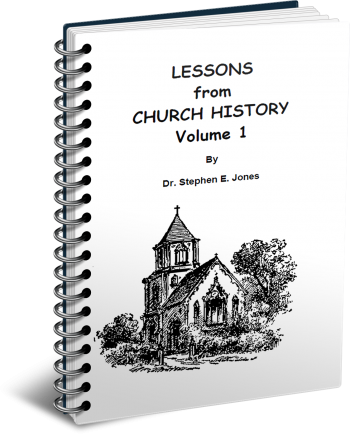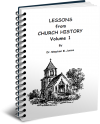Latest Posts
View the latest posts in an easy-to-read list format, with filtering options.

Volume 1. This gives a short history of the Church from the apostles to the Roman War, including Luke’s account of Paul’s journeys in the book of Acts. It includes Paul’s fourth missionary journey to Spain and Britain.
Category - History and Prophecy

It is generally noted in Christendom that the Church began on the day of Pentecost, as recorded in the second chapter of Acts, and that it was established by the coming of the Holy Spirit.
However, that explanation is too simplistic to give us any serious understanding of Scripture or the divine plan in history. Acts 7:38 speaks plainly of “the Church in the wilderness” (under Moses). In fact, Jesus Himself speaks of the Church in Matt. 18:17 as if it already existed.
The simple fact is that the word translated "Church" is from the Greek, ekklesia, which means “congregation.” The Greek translation of the Old Testament (the Septuagint) was the standard in Jesus' day by which we might understand how the Hebrew concepts were to be expressed by Greek words. The Septuagint normally renders the Hebrew kahal (“congregation”) by its Greek equivalent, ekklesia.
Hebrews 2:12 does the same when it quotes Psalm 22:22, “in the midst of the Church will I praise Thee.”
So it is apparent that the Church existed prior to the day of Pentecost. Rather than say that the Church came into existence at Pentecost, we should say that the Church received its Pentecostal anointing at that time. Prior to that time, it had only a Passover anointing. And at the end of the Pentecostal Age we should see the Church receive a Tabernacles anointing.
This manner of thinking gives the Church a continuous existence from the beginning. This also helps us to see the Bible as a single book about Church history, rather than seeing Christianity essentially as a “new religion” established in something “new” called “The Church.”
Even so, a dramatic change occurred on the day of Pentecost, which I have explained often in my writings. This change meant that the glory of God, which was removed first from Shiloh and then from Jerusalem, now became resident in the people themselves—that is, the “congregation”—which is called The Church. No longer were men required to go to some particular location to meet with God, but were to turn inward to Christ dwelling in them. The people were now the place where God had chosen to place His Name, with all that this implied.
Such a change decentralized the Church and established Jesus' words when He told the Samaritan woman in John 4:21-24,
{John 4:21} 21 . . . an hour is coming when neither in this mountain nor in Jerusalem shall you worship the Father . . . {John 4:24} 24 God is spirit, and those who worship Him must worship in spirit and truth.
In later years, the Christians seemed to forget this and once again patterned the Church on the model of the Old Covenant and on the old Jerusalem. “Church” became identified with each religious organization centered around the bishops. Still later, the Roman bishops claimed that the Church existed only where the other churches recognized Roman primacy. Thus, Rome’s religious organization became the Christian Jerusalem and was identified as The Church.
Rome’s definition of the Church did not change significantly until Vatican II (1964), when it came to be defined as “the People of God.” This surprising development, however, only created a double definition of the term, one official and the other practical. The official definition is precisely correct, for “the People of God” are the congregation. But yet the Catholic Church still limits those “People” to Catholics, which, in practice, perpetuates the old definition by identifying the “People” with those who are in good standing with the organization and hierarchy.
Though Pentecost's anointing was designed to break men's dependence upon holy real estate, most of the leaders lost that anointing. They justified themselves, then, by insisting that Pentecost was a flash-in-the-pan, a single moment in history, or at best an Apostolic experience that ended with the death of John, the last of the original Apostles.
Such thinking prepared the way for the great return to Old Covenant modes of thought, though couched in New Covenant terminology. Instead of Jerusalem, they now looked to Rome. While the priests spoke about the Melchizedek priesthood, they dressed and acted much like Aaronic priests. And, like the priests of old, these new priests increasingly usurped the authority of God and of Jesus Christ by presuming to overrule Him at will.
But it took many years for this new religion to take shape. There were those who opposed it from the start, but in the course of Church history, most of those voices were ultimately silenced, often by force and violence.
The dawn of the Protestant Reformation, which really began with Wycliff in the late 13th century, was sparked by the Bible coming into the hands of the common people, where they could actually read the Scriptures and compare it to the religion being practiced in the Cathedrals among the priests. This trickle became a flood with the development of the printing press in the mid-1400's, when the Scriptures were made available at low costs.
Yet because the Reformation Church developed during the Pentecostal Age (33-1993 A.D.), it could do little more than attempt to regain what had been lost in the first-century Church. Human nature was still present, with its corruptible tendencies. Pentecost was a leavened feast (Lev. 23:17), and so the perfection of human nature could not be accomplished yet. For this reason, Protestantism itself immediately began its own reversion toward centralization, holy real estate, and dependence upon approved priesthoods.
Whereas in earlier times, Rome replaced Jerusalem as the supposed seat of God, the Protestant denominations simply replaced Rome and its religious system with one of their own, based in another city. Instead of being different in nature, the denominations simply became competitors, each claiming to be “The True Church” through whose membership one might attain salvation.
Thus, the true spirit of Pentecost continued to be lost or obscured by the pomp and ceremony of organized religions. And when Pentecost was renewed in the early 1900's through Charles Parham, Seymour, and others, it was soon denominationalized. Thus, a century later, we see the Church in its shallow state once again, with its focus on entertainment, glitz, and glitter. Televangelists compete for contributions to maintain their empires, and Churches compete for members by trying to provide the best “praise and worship” and other programs.
In America, the focus is no longer on teaching Scripture. People go to "Church" for every other reason: to take sacraments, to hear some psychology about how to live a better life, to praise and worship, to meet friends socially, or even to show off their Easter hats and dresses. These things are not necessarily evil in themselves, but where are the Bible teaching centers? They hardly exist, because Americans are largely bored with Bible teaching.
Many have been taught that they exist only to praise God and worship Him—which is certainly a partial truth, but the highest form of praise and worship is to imitate Him and be like Him. How is anyone going to be like Him without knowing more about Him? Is it not important to know His Mind? What He has planned for you, not only as an individual, but for the world and for creation itself? Are so few people interested in the knowledge needed to rule and reign with Christ in the Age to come?
I know that there are many who are interested in such things, but there is a famine of hearing the Word, and most do not know where to find it. They often go from Church to Church looking for it, and finally they give up, thinking that what is being preached must be all that there is to know.
The School System teaches history in the most boring way, giving most Christians the idea that history is a secular subject that happens to be largely irrelevant to us. This has assisted in spreading the idea that Christianity is purely an experiential religion, and the Bible is then interpreted accordingly. This has paved the way for the acceptance of the metaphysical view of Christianity promoted by Charles Fillmore, who founded the Unity Church a century ago. His book, Prosperity, has now been adopted by the Prosperity teachers, though they seldom give him credit.
To counter the deficiency, I want to give you some Church history, which tells you how the condition of the Church developed. Much of which is almost totally unknown even to theologians and seminary graduates. The lessons to be learned from Church history will help us to avoid making the same mistakes over and over in the present time. I think you will find it to be absolutely fascinating as the New Testament comes to life.
There are many people mentioned in the New Testament who are never named. It was dangerous to be named in those days, so many remain anonymous unless one studies Church history. The Church also developed within the context of the historical events happening around them. It is not possible to have a clear grasp of Church history without knowing how secular history impacted it. And so this book (and series of books) will put the Church into its proper historical context.